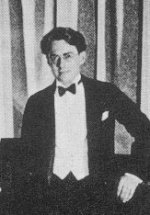Related Research Articles
The year 1957 in television involved some significant events. Below is a list of television-related events during 1957.
The year 1956 in television involved some significant events. Below is a list of television-related events during 1956.
The year 1955 in television involved some significant events. Below is a list of television-related events during 1955.
The year 1953 in television involved some significant events. Below is a list of television-related events during 1953.
The year 1952 in television involved some significant events. Below is a list of television-related events during 1952.

Bob and Ray were an American comedy duo whose career spanned five decades, composed of comedians Bob Elliott (1923–2016) and Ray Goulding (1922–1990). The duo's format was typically to satirize the medium in which they were performing, such as conducting radio or television interviews, with off-the-wall dialogue presented in a generally deadpan style as though it were a serious broadcast.

Lux Radio Theatre, sometimes spelled Lux Radio Theater, a classic radio anthology series, was broadcast on the NBC Blue Network (1934–35) ; CBS Radio network (1935–54), and NBC Radio (1954–55). Initially, the series adapted Broadway plays during its first two seasons before it began adapting films. These hour-long radio programs were performed live before studio audiences. The series became the most popular dramatic anthology series on radio, broadcast for more than 20 years and continued on television as the Lux Video Theatre through most of the 1950s. The primary sponsor of the show was Unilever through its Lux Soap brand.

Judy Canova, born Juliette Canova, was an American comedienne, actress, singer and radio personality who appeared on Broadway and in films. She hosted her own self-titled network radio program, a popular series broadcast from 1943 to 1955.

Jesse White was an American actor who was best known for his portrayal as "Ol' Lonely" the repairman in Maytag television commercials from 1967 to 1988.

One Man's Family is an American radio soap opera, heard for almost three decades, from 1932 to 1959. Created by Carlton E. Morse, it was the longest-running uninterrupted dramatic serial in the history of American radio. Television versions of the series aired in prime time from 1949 to 1952 and in daytime from 1954 to 1955.

An anthology series is a written series, radio, television, film, or video game series that presents a different story and a different set of characters in each different episode, season, segment, or short. These usually have a different cast in each episode, but several series in the past, such as Four Star Playhouse, employed a permanent troupe of character actors who would appear in a different drama each week. Some anthology series, such as Studio One, began on radio and then expanded to television.
Sumner Locke Elliott was an Australian novelist and playwright.

Ford Theatre, spelled Ford Theater for the original radio version and known, in full, as The Ford Television Theatre for the TV version, is a radio and television anthology series broadcast in the United States in the 1940s and 1950s. At various times the television series appeared on all three major television networks, while the radio version was broadcast on two separate networks and on two separate coasts. Ford Theatre was named for its sponsor, the Ford Motor Company, which had an earlier success with its concert music series, The Ford Sunday Evening Hour (1934–42).

Cavalcade of America is an anthology drama series that was sponsored by the DuPont Company, although it occasionally presented musicals, such as an adaptation of Show Boat, and condensed biographies of popular composers. It was initially broadcast on radio from 1935 to 1953, and on television from 1952 to 1957. Originally on CBS, the series pioneered the use of anthology drama for company audio advertising.

Matinee Theater is an American anthology series that aired on NBC during the Golden Age of Television, from October 31, 1955, to June 27, 1958. Its name is often seen as Matinee Theatre.

Cameo Theatre is an American anthology series that aired on NBC during the Golden Age of Television, from 1950 to 1955, three times as a summer replacement and once as a mid-season replacement for other series.
Ernest Kinoy was an American writer, screenwriter and playwright.
Rex Rienits was an Australian writer of radio, films, plays and TV. He was a journalist before becoming one of the leading radio writers in Australia. He moved to England in 1949 and worked for a number of years there. He later returned to Australia and worked on early local TV drama.
ABC Mystery Theater, also known as just simply Mystery Theater or Mystery Theatre, was an American radio anthology, crime and mystery series from the 1950s. The program starred originally, actor Robert Carroll in the title role of Inspector Mark Saber, a British detective from the Homicide Squad then by actor Les Damon for seasons two and three. The program also centered on Saber's assistant Sgt. Tim Maloney, originally portrayed by character actor James Westerfield for the first half of season one, actor Douglas Chandler for the second half of season one and finally by character actor Walter Burke for seasons two and three.

"We Were Children" is a 1952 American television play by Sumner Locke Elliott. It originally aired as an episode of The Philco Television Playhouse produced by Fred Coe.
References
- ↑ "Friday the 13th on Playhouse". The Times-Mail. 26 June 1954. p. 10.
- 1 2 "Commercial", ABC Weekly, vol. 17, no. 6, Sydney: ABC, 5 February 1955, nla.obj-1698497561, retrieved 20 November 2023– via Trove
- ↑ "WEDNESDAY, FEB. 9". The Sunday Times . No. 2931. Western Australia. 6 February 1955. p. 19. Retrieved 20 November 2023– via National Library of Australia.